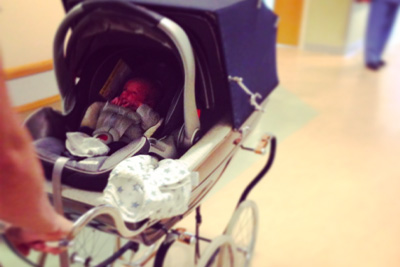Bringing home your newborn is one of the most exciting, and nerve wracking, moments in any new parents life. “You’re letting me walk out of here with this helpless ball of adorable? Are you sure?!”
They’re sure. Most parents bumble through the first diaper changes or YouTube how to give a sponge bath with enough success to keep everyone involved alive and well. But sometimes you need extra assistance from a seasoned professional.
Have these 4 support systems on speed dial before leaving the hospital, just in case. Because searching online for help while bleary eyed at 3am is just as productive as it seems.
1. Postpartum Doula
Hiring a postpartum doula may be the single most important thing to make the transition from hospital to home go smoothly, and many new parents don’t even know what one is! Unlike a baby nurse, a postpartum doula takes care of the family, not just the baby. Usually trained in breastfeeding counseling and newborn care, a postpartum doula can help you with latching, swaddling and routines. Most will also unobtrusively make a healthy meal, do a load of laundry, and then quietly sneak out leaving the place cleaner than when they came. Think of a postpartum doula as the perfect mother-in-law without the unsolicited “advice.” Hired by the hour, day, or even overnight.
2. International Board Certified Lactation Consultant (IBCLC)
As a Childbirth Educator I always recommend that my clients request to be seen by an International Board Certified Lactation Consultant before they leave the hospital. Labor and Delivery Nurses are an awesome resource for new moms, but IBCLCs are true experts in their field and can spot issues with position and latch that make all the difference as you start breastfeeding for the first time. That support shouldn’t end when you leave the hospital because many breastfeeding issues arise as your mature milk “comes in” on day 3 or 4, after you’re already home. Such issues as soreness or milk supply are best dealt with right away, before they turn into more serious problems.
Want to be even more prepared? Take a breastfeeding class before you deliver to get the low down on feeding expectations, troubleshooting issues and when and if you need to pump.
3. Mental Health Professional
Prenatal anxiety, baby blues, postpartum depression – many women experience one or all of these mood changes during or after pregnancy. If this sounds familiar, know that you are not alone, it’s not your fault, and you can and should receive treatment. Many therapists specialize in the postpartum period and may even hold special support groups in your area. Make a prenatal plan in advance with your partner to talk about expectations and whom you might turn to if you don’t feel like yourself.
4. New Mom Group
Its been celebrated, and it’s been mocked, but even the most resistant new moms, “I already have friends!” usually find themselves converted. A safe place to commiserate about lack of sleep, frustrations with feedings, and, yes, make a few new friends, a New Mom Group can be a real lifeline to share and explore your new role of “mom,” especially for those without family nearby. The New Mom Group that I lead has led to play dates, weekly walking groups, nanny shares and life long friendships.
